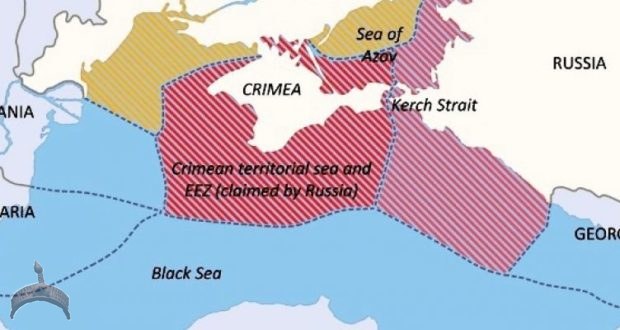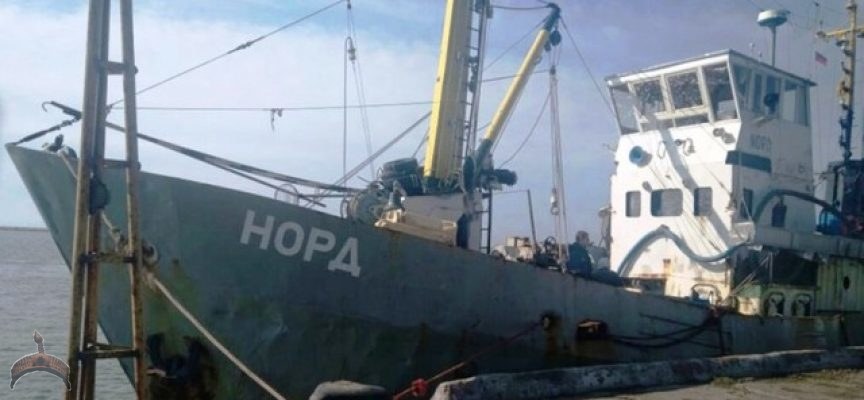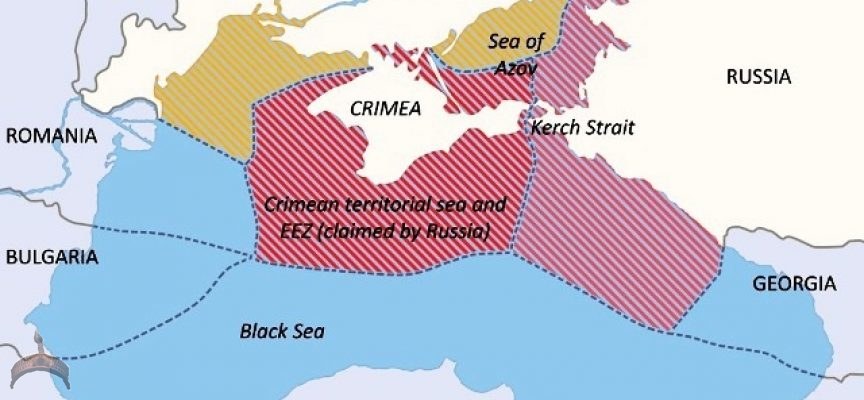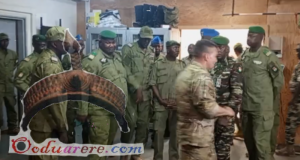by Scott Humor
“Ukraine will detain all the ships travelling to and out of Crimea without Kiev’s consent, ” said Ukrainian Border Service Spokesman Oleg Slobodyan commenting on the arrest of Russia’s Nord, a fishing boat from Kerch. Claiming that the Kiev regime is in the “legal framework,” he said that Ukraine will continue hijacking vessels of other nationalities and kidnapping people on board of those vessel and imprison those people for years on monstrous charges.
“Ukraine’s position is unequivocal, it considers Crimea to be an occupied part of its territory so law enforcement agencies will promptly respond to violations committed by those traveling in and out of Crimea.” Source.
This story started on March 24th, when Ukrainian border forces entered the Russian-flagged, Crimean-registered fishing vessel the Nord in the Sea of Azov, threatened an unarmed crew with assault weapons, and proceeded to hijack the vessel with her crew of 10 fishermen and 5 tons of fish. The fishing boat, reportedly, is owned by the Crimean sovhoz or a collective farm named the May 1st. However, there are also reports that this vessel is owned by the conglomerate of companies “Baltic Coast,” one of the biggest fish farming and food producing company in Russia. After declaring a bankruptcy in 1916, after unexplained loss of its entire livestock of farmed fish, the company previously based in Cyprus, is now based in St. Petersburg and owned by its biggest creditor, the Sberbank.
Ukrainian authorities charge the Nord with illegally crossing Ukraine’s maritime borders and fishing within boundaries of Ukraine’s coastal waters in the Sea of Azov within a breadth of 12 nautical miles.
“According to the Ukrainian border service, the Nord was detained off the Obytichna peninsula, a spit extending into the northern end of the Sea of Azov. The service said that the Nord had papers showing that she was registered in Kerch, Crimea, and its crew possessed Crimean-issued passports identifying them as Russian citizens. ” source
Indeed, a 2002 Draft Law on Inland Water, the Territorial Sea and the adjacent zone of Ukraine defined the territorial sea of Ukraine as including Ukraine’s coastal waters in the Sea of Azov within a breadth of 12 nautical miles (Article 2). However, this draft law was never adopted.
In a Joint Statement by the President of Ukraine and the President of the Russian Federation on the Sea of Azov and the Strait of Kerch of 24 December 2003 (for a translation, see Law of the Sea Bulletin 54 (2004), p. 131) both States reiterated the terms of the Cooperation Agreement and claimed that “historically the Sea of Azov and the Strait of Kerch are internal waters of Ukraine and Russia.” See an Agreement on Cooperation on the Use of the Sea of Azov and the Kerch Strait (Cooperation Agreement) 2018
Ukraine v. Russia: Passage through Kerch…
The Nord has been taken to Berdaynsk, a military installation near Mariupol. The crew members reported interrogation, and mental and physical torture and abuse by Ukrainian authorities. Initially, they were forbidden to leave the vessel that is not design for people to live on board for more than three days, and they were charged in “illegally crossing the border,” and other charges, like treason for becoming Russia’s citizens. The captain, 57 y.o. Vladimir Gorbenko was taken to the SBU (a proxy for the CIA) where he was interrogated to the point of him falling dangerously ill. He was taken to a hospital in Kherson with a precursor to a heart attack. He was reportedly charged with a “violation of the order of entry into the occupied territory of Ukraine,” meaning Crimea, despite the fact that he had been born in the USSR on the territory of Crimea, and lived there his entire life.
If convicted, the crew of the Nord could face from 5 to 15 years in jail.
Russia’s Ministry of Foreign Affairs has demanded the Kiev authorities to grant them a consular access to the crew, which was denied.
Kiev authorities claim that they don’t consider people residing on the territory of Crimea to be Russian citizens, because they “received their citizenship on the occupied territory.”
Neither the flag of a country, no a citizenship can be forcibly imposed on a person or a vessel if they claim that they have a citizenship or a flag of another state.
“International human rights law provides that the right of States to decide who their nationals are is not absolute and, in particular, States must comply with their human rights obligations concerning the granting and loss of nationality.”
Arbitrary Deprivation of Nationality: Ukraine arbitrarily depraved 10 citizens of Russia of their nationality.
The right to retain a nationality corresponds to the prohibition of arbitrary deprivation of nationality.
Ukraine deliberately misrepresents the basic facts concerning citizenship and a civil vessel flag of operation.
Ukraine hijacked a vessel and transported its crew to its territory, against the crew’s members will and under threat of use of firearms. After forcefully and under threat of using firearms Ukraine transported the crew to its territory, Ukraine started claiming that the crew “violated its state border.”
In some cases, “a State would recognize a person as a “national” for the purpose of international law and provide him with diplomatic protection, however, not regard him as a full “citizen” for the purpose of the internal political right to elect and be elected.”Source
Since Poroshenko’s regime punishes people rather than “protecting” them, this is not applicable.
An issue of a country claiming a sovereignty over a vessel because of its port of registration
Kiev authority refuse to allow Russian diplomats to meet with the crew members. Since all of them have Russian citizenship is the direct violation of multiple international and bilateral agreements.
The general outdated principle governing diplomatic protection of dual nationals was set forth by article 4 of the 1930 Hague Convention: “a State may not afford diplomatic protection to one of its nationals against a State whose nationality such person also possesses.” This so called “nonresponsibility rule” is no longer the prevailing principle applicable to all cases where issues arise with respect to conflicting nationalities. It has been replaced by the principle of “effective nationality” as outlined by the International Court of Justice in the Nottebohm case, decided in 1955. An effective or real nationality principle is based on based on the facts like the stronger factual ties between a person and one of these states whose nationality is involved. Different factors that are being taken into consideration: the habitual residence, his family ties, place of employment, attachment shown by him for a given country and inculcated in his children, etc. Source.
In addition, diplomatic relations between Russia and Ukraine have been governed by the Consular Convention Between the Russian Federation and Ukraine (Moscow, 15 January 1993)
According to this bilateral convention, Russia and Ukraine recognize each other citizenships:
(9) “citizen” means any natural person who belongs to the represented state, or a state of residence under the laws of those states.
(12) “vessel” means any civil vessel that is entitled to fly the flag of the representative state.
(13)” aircraft ” means any civil aircraft which is entitled to use of the identification marks of the representative state.
Compare, “Flying a country’s flag constitutes a claim by the vessel flying it that it possesses the nationality of the flag”(NWP 1-14M, The Commander’s Handbook on the Law of Naval Operations),
Home port and the port of vessels’ nationality
Ukrainian side claims that the vessel is theirs, or “Ukrainian,” because it is registered in the port of Kerch. Since I couldn’t verify either the boat is owned by the Kerch fishermen’ collective farm, or by the Baltic Coast company based in Saint Petersburg, we will leave this question out of this research. As for Ukrainian’s claim that the boat is their because it’s registered in the port of Kerch which they consider to be also “Ukrainian,” then they simply arrested their “own boat” registered in “their own port” fishing in “their own waters,” all according to their perverse logic.
A brief historic reference. Kerch was founded 2600 years ago as a Greek port, was intermittently under the control of Byzantine and Ottoman empires, and since the battle of the Kerch Strait in 1790 has been Russian port. In 1956, Kerch as a part of Crimea was transferred under the local management of the Ukrainian Soviet Socialist republic by the head of the Communist party Nikita Khrushchev. The transfer of Crimea was completed with multiple violations of the Constitution of the USSR.
After the Ukrainian Soviet Socialist republic declared its “independence” from the USSR, which was also done with the multiple violations of the Constitution of the USSR, it lost its privilege to have a jurisdiction over Crimea, however it used threats of use of military force to occupy the peninsula from 1992 to 2014, when after an armed anti-government putsch in Kiev and in the absence of any legitimate central government, Crimeans voted for independence from Ukraine and re-unification with Russia.
Wikipedia: A vessel‘s home port is the port at which it is based, which may not be the same as its port of registryshown on its registration documents and lettered on the stern of the ship’s hull.
Ukraine claims that the arrested fishermen are the Ukrainian citizens, and that their Russian citizenship is not valid due to Kiev’s regime claims on the location where they received their Russian passports. That’s why Poroshenko’s regime says it is denying the Russia’s ministry of Foreign Affairs access to detained Russia’s citizens.
“The vessel “Nord” is Ukrainian (registration port — Kerch), and crew members, presumably, are also citizens of Ukraine, and therefore access to them by officials of Russian diplomatic institutions is not provided, ” states Poroshenko’s regime in its press-release.
Despite of claiming that ten fishermen are the citizens of Ukraine, Kiev regime charges them with Article 332-2of Ukraine’s Criminal Code.
Article 332. Illegal transportation of persons across a state border of Ukraine
- Illegal transportation of persons through the state border of Ukraine, organization of illegal transportation of persons through the state border of Ukraine, the leadership of such acts or facilitating their commission by advice, instructions, provision of means or removal of obstacles shall be punishable by deprivation of liberty for a term of three to five years.
And here the legal point that absolutely makes no sense:
Kiev regime claims that ten fishermen are all citizens of Ukraine.
Kiev regime has also officially claims that the Nord finishing boat is a “Ukrainian boat,” and it registered in “Ukrainian port of Kerch.”
Kiev regime also publicly stated that the boat was 15 nautical miles off the coats of Ukraine at the time of arrest, which the regime claims to be its territorial waters. Why it’s not so, see below.
So, according to the Kiev regime a “Ukrainian boat” with a “Ukrainian crew” left “Ukrainian port” traveled across “Ukrainian Azov Sea.” How on earth the boat and the crew could be arrested for illegally crossing the state border of Ukraine and jailed the crew for up to 5 years?
Kiev regime violates human rights of population that according to Kiev’s regime is residing on allegedly “occupied territory” of Crimea
Let’s for the sake of the argument look at the issue from the point of view of Kiev’s regime.
Kiev authorities issued a statement that all persons and ships residing in Crimea, or visiting or making port calls will be arrested and jailed, because the regime considers Crimea to be “occupied territory.”
Kiev authorities claim that they will keep kidnapping and jailing civilians who live on the “occupied territory.”
However, there are several international conventions and protocols protecting people living on “occupied territories” and protecting civilians in time of wars. If Kiev’s authorities believe against all odds that they are in war with Russia and that Crimea is an “occupied territory” they must be abiding by those international conventions. To name a few:
- Protection of civilian persons and populations in time of war 1988: Basic rules of the Geneva Conventions and their Additional Protocols. Additional Protocol I, Part IV. Geneva Convention relative to the protection of civilian persons in time of war (Convention IV of 12 August 1949)
- OF CIVILIAN PERSONS IN TIME OF WAR – The Geneva Convention of 12 August 1949, Volume IV
- the International Covenant on Civil and Political Rights and the International Covenant on Economic, Social and Cultural Rights, both of which were adopted by the UN in 1966. They reiterate that states are obliged to protect the human rights – as detailed in each covenant – of all persons living under their jurisdiction, and also add two collective rights: that all peoples have the right to self-determination and the right to use their natural resources freely, as they see fit.
- the Fourth Geneva Convention which addresses the protection of civilians.
- also establishes that the people who lived in the occupied territory prior to the occupation are considered “protected persons.”
Other bilateral agreements Poroshenko’s regime is violating by its hostile actions towards the Nord.
A violation of the joined Protocol of control over use of trade and other vessels to extract from water biological resources in the water area of the Azov Sea and the Kerch Strait for 2018
As noted by The Federal Agency for Fishery (Rosrybolovstvo), a federal executive body responsible for: control (oversight) in fisheries and conservation of marine biological resources in Russia’s inland waters, suspended an agreement on the “Protocol of control over use of trade and other vessels to extract from water biological resources in the water area of the Azov Sea and the Kerch Strait for 2018,” which Russia and Ukraine signed in October 2017, the vessel should have been returned to the port of basing or fishing, even if it violated fishing regulations. Only then should a decision be made on possible sanctions against the leadership of the ship. However, in the case of the Nord, Ukrainian border guards acted differently: under the threat of the use of force, seiner was sent to the port of Berdyansk on Ukranian territory.
Protocol of control over use of trade and other vessels to extract from water biological resources in the water area of the Azov Sea and the Kerch Strait for 2018
The 29th session of the Russian-Ukrainian Commission for fisheries in the Sea of Azov was held in Rostov-on-Don from 24 to 26 October last year. In particular, the parties approved the procedure for the control of use of aquatic biological resources by fishing vessels and other vessels in the Azov sea and the Kerch Strait in 2018. following the meeting, a Protocol was signed.
According to paragraph 7 of Annex 8 of this document, “upon detection of violations of the provisions of the Protocol of the Commission and scientific programs, a representative of the specially authorized bodies of the States of the relying party shall prepare materials on the detected violations in duplicate, make video and photo documenting a violation, and make an appropriate entry in the logbook. The logbook and documents authorizing fishing activities shall be withdrawn and sealed, and with the first copy of the documents drawn up, sent by registered letter with notification to the specially authorized bodies of the state of the party to which the infringing vessel belongs, for consideration and adoption of measures of impact in accordance with the legislation of the state. Copies of the documents remain on board .
According to the Protocol, the vessel suspected of violation is sent to the home port or to the fishing port. That is where the competent authorities should decide on further action on the vessel .
On April 4 2018, after Kiev regime hijacked the Nord, Russia suspended this Protocol.
At first, Ukrainian side claimed that the sailors were “national traitors,” because they decided to become citizens of Russia.
Then, they started claiming that the crew violated maritime borders of Ukraine and that they “illegally entered Ukraine’s territorial waters.”
Due to historical reasons, Russia and Ukraine have been using the Azov Sea on shared principle, and not on the international waters principle that would assign to each country twelve nautical mile territorial waters.
Ukrainian state piracy and ongoing Ukraine vs. Russia Arbitral Tribunal’s Jurisdiction under Article 288 UNCLOS
This latest instance of Ukrainian state piracy brings out a question of the status of the Azov Sea. Until this incident, Ukraine enjoyed a shared use of the sea and the Kerch Strait. Now, it all might change.
According to the 1982 United Nations Convention (Article 123) in avoiding the difficult question of semi-enclosed seas, left this question to the discretion of the coastal States themselves, having recommended that they merely cooperate with one another in the exercise of their rights and duties provided for by the 1982 United Nations Convention on questions of the exploration, exploitation, and conservation of bioresources, conducting scientific research, protection of the marine environment, and so on. So far the delegations of the parties for determining the status of the Sea of Azov and Kerchensk Strait have not succeeded in reaching an agreement.” Source: Kovalev, A. A. Contemporary Issues of the Law of the Sea: Modern Russian Approaches (2004)
Ukraine’s claims under the Cooperation Agreement, the Safety and Navigation Agreement, and the FCN-Treaty do not fall within the arbitral tribunal’s jurisdiction ratione materiae. Equally, claims based solely on customary international law are excluded from the scope of Part XV.
Russia’s Declaration under Article 298(1)(a) UNCLOS
Russia has, by way of declaration under Article 298(1)(a) UNCLOS, excluded any disputes “involving historic bays or titles” from the applicability of the compulsory dispute settlement mechanism of Part XV. On that basis, Russia might argue that any claims concerning Kerch Strait and the Sea of Azov involve such questions which, if true, would deprive the arbitral tribunal of jurisdiction in that respect. While we will refrain from discussing whether this argument would be successful, it should be noted that claims concerning historic bays have not been extinguished by UNCLOS per se. In any case, classifying the Sea of Azov as a historic bay would arguably mean to limit Ukraine’s potential claims to those based on customary international law, which in turn would probably not fall within the limited scope of Article 288(1) UNCLOS.
The UNCLOS arbitral tribunal would only have jurisdiction over issues which do not require an incidental decision on sovereignty over Crimea. This would exclude the question of Ukraine’s coastal State rights in the Crimean territorial sea.
Finally, as has been pointed out by Tzeng, relevant agreements may potentially contain dispute settlement clauses which constitute agreements of Russia and Ukraine “to seek settlement of the dispute by a peaceful means of their own choice” which “exclude any further procedure”, thus posing an obstacle to jurisdiction under Article 281(1) UNCLOS.
Russia’s measures in response to Ukrainian state piracy
As a result, Rosrybolovstvo has suspended all the agreements reached earlier with Ukraine, according to the website of the Russian Ministry.
Russia, concerned about seizure of Russian vessels, and the formation of state-level piracy, is now considering the issue of ensuring the safety of navigation in the north-eastern part of the Black Sea, in particular, the permanent presence of its naval forces and equipment in this area, in addition to maritime border guards.
Briefing by Foreign Ministry Spokesperson Maria Zakharova, Moscow, April 4, 2018
In addition, the office of the FSB in the Crimea opened a criminal case against Ukrainian border guards detained Russian fishermen, a criminal case under article of article 211 of the criminal code (“stealing of a vessel air or water transport or railway rolling stock”).
April 5. /TASS./ Russia sets up the Operations Task Force in Prevention of Piracy on the part of Ukrainecreated in the Azov-black sea territorial management (ACHTU).
“Igor Rulev (head of ACHTU) informed the Council members about the measures taken to ensure the safety of Russian fishermen fishing in the sea of Azov. He said that in ACHTU created a task force to coordinate actions of the Agency with the border controls, providing information on the whereabouts of fishing vessels in the Azov sea to prevent piracy on the part of Ukraine,” – stated the agency’s press release.
On April 4th, the Research Institute Of The Azov Sea Fishery Problems (AzNIIRKH) in Rostov-on-Don issued a press release stating that fishermen can now fish in the sea of Azov without fear.
“Fishermen can fearlessly go fishing in the sea of Azov, their security is ensured by the border control of the FSB of Russia in the Krasnodar territory and the Republic of Crimea,” — said the head of the Azov-black sea territorial administration (AZNIIRKH) Rosrybolovstva Igor Rulev.
He said that a special operations task force has been created to coordinate actions of the Agency with the border controls, providing information on the whereabouts of fishing vessels in the Azov Sea to prevent piracy on the part of Ukraine.
The fishermen have received recommendations related to the procedure leaving to go fishing in the Sea of Azov. It involves a mandatory prior notification of the border guard on departure of a vessel, and notifications about changes in her location. In case of emergency, fishermen are advised to issue an emergency contact at a certain frequency.
The Agency reissued that by following its recommendations, the fishermen can fearlessly go out to the sea to fish.
——
Ukraine v. Russia: Passage through Kerch Strait and the Sea of Azov
Scott Humor
Director of Research and Development
author of The enemy of the State
POKÉMON IN UKRAINE: Tactical War Game Introduction MANUAL (War Game Manuals Book
In case you have forgotten what happened in Ukraine, this book should refresh your memory with the incredibly precise and humorous chronicles: ANTHOLOGY OF RUSSIAN HUMOR: FROM MAIDAN TO TRUMP
 Ọmọ Oòduà Naija Gist | News From Nigeria | Entertainment gist Nigeria|Networking|News.. Visit for Nigeria breaking news , Nigerian Movies , Naija music , Jobs In Nigeria , Naija News , Nollywood, Gist and more
Ọmọ Oòduà Naija Gist | News From Nigeria | Entertainment gist Nigeria|Networking|News.. Visit for Nigeria breaking news , Nigerian Movies , Naija music , Jobs In Nigeria , Naija News , Nollywood, Gist and more



 by Scott Humor
by Scott Humor






